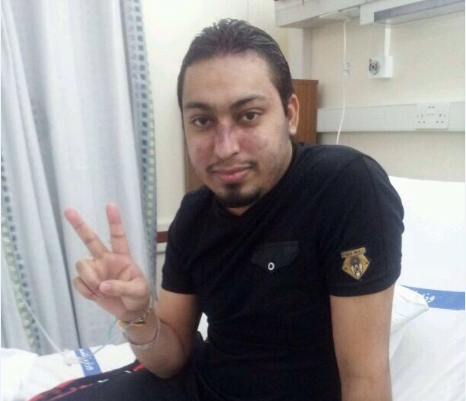Fadhel Abbas Isa was a college student before his arrest in 2012. He was arrested, tortured, threatened, and subjected to unfair trials in violation of his human rights. While in prison, Fadhel was diagnosed with lupus. His health has deteriorated due to torture and the unsanitary conditions in Jau Prison, in which he has remained for more than seven years.
On 29 March 2012, Bahraini security forces, including the Ministry of Interior’s vehicles, Special Security Force Command, and Criminal Investigation Directorate (CID) officers, arrested Fadhel while he was sleeping in his house in Sahla. His parents did not know the reason for the arrest at the time, but were later presented with an arrest warrant. The warrant named Fadhel alongside several others, all of whom had been accused of illegal assembly. After his arrest, officers disappeared Fadhel for three days at the CID, during which he was denied access to his attorney and tortured in order to produce a confession. Three days later, he was allowed to contact his family for the first time and was transferred to Dry Dock Detention.
Six months after his initial arrest for illegal gathering, on 26 September 2012, Fadhel was sentenced to one year in prison and transferred to Jau Prison. In addition to being subjected to torture at the CID, officers also beat and threatened Fadhel at both Dry Dock and Jau. When the one-year sentence drew to a close, Fadhel, among other convicts, was accused of attacking a police vehicle and attempted murder. Facing these accusations, on 30 March 2014, he was sentenced to life in prison. This decision was appealed on 31 August 2014, and his sentence was reduced to 15 years in prison. Because of his treatment and torture in prison, Fadhel’s health deteriorated, especially during a period of incidents in March 2015 at Jau Prison, in which inmates were left for days outside of their cells lying on cement in the hot sun. When Fadhel finally saw a doctor, he was told that his medical situation did not require his departure from prison to the hospital. However, Fadhel started to feel dizzy and fainted. He was transferred to King Hamad University Hospital and his family insisted on visiting him, they barely recognized him due to his disease.
Six months after his arrest, Fadhel was diagnosed with systemic lupus erythematosus (SLE), a disease that causes the body’s immune system to mistakenly attack healthy tissue in various parts of the body. King Hamad University Hospital did not have any specialists in genetic blood disease, and Fadhel’s treatment was delayed. After several attempts and a lengthy procedure, a specialist from Salmaniya Medical Complex came to visit him and ordered his immediate transfer to Salmaniya Complex. During his seven years of imprisonment, Fadhel did not receive medication on time as his appointments with doctors were frequently cancelled. The prison’s forensic doctor did not allow Fadhel’s transfer to the hospital, despite his condition requiring constant follow-up due to his weak immune system. Additionally, the unsanitary prison environment is a constant threat to his health.
Fadhel’s arrest and imprisonment are in violation of Bahraini’s international law obligations, including the International Covenant on Civil and Political Rights (ICCPR) and the Convention Against Torture and Other Cruel, Inhuman or Degrading Treatment or Punishment (CAT), as well as the International Covenant on Economic Social and Cultural Rights (ICESCR), to each of which Bahrain has acceded. His arbitrary detention, his disappearance, torture, and unfair trial are in violation of Articles 7, 9, 10 and 14 of the ICCPR and the CAT. Fadhel was not promptly presented before a judicial authority and confessions obtained under torture have been used against him, which are also a violation of the ICCPR and the CAT. Additionally, his lack of treatment is in violation of Article 12 of the ICESCR in which everybody processes the right to the highest attainable standard of physical and mental health.
Americans for Democracy & Human Rights in Bahrain (ADHRB) calls on the government to provide Fadhel with appropriate medical care, and to release him in light of his medical condition and unfair trials. ADHRB also calls on the Bahraini authorities to investigate Fadhel’s allegation of torture, with a view to holding the perpetrators accountable. Finally, ADHRB calls on the authorities to provide appropriate medical care and conditions of detention to all prisoners in Bahrain.





